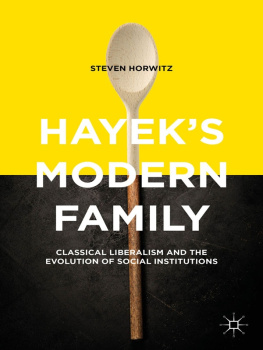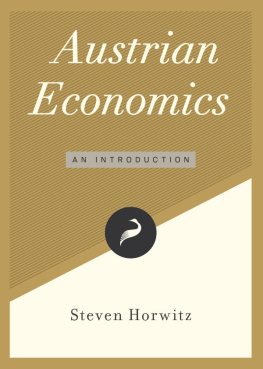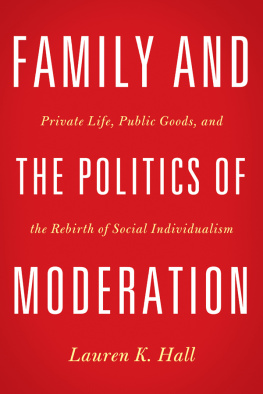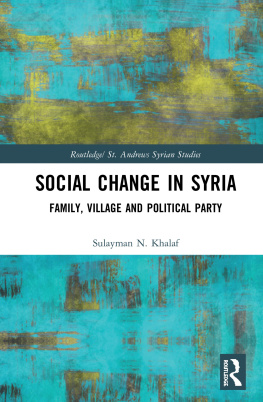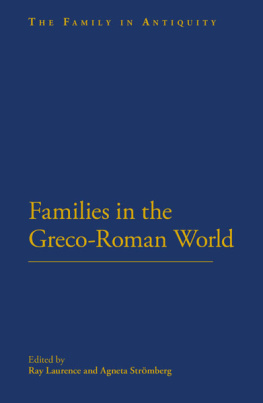Hayeks Modern Family
Hayeks Modern Family
Classical Liberalism and the Evolution of Social Institutions
Steven Horwitz


HAYEKS MODERN FAMILY
Copyright Steven Horwitz, 2015.
All rights reserved.
was originally published as Heterogeneous Human Capital, Uncertainty, and the Structure of Plans: A Market Process Approach to Marriage and Divorce (with Peter Lewin), Review of Austrian Economics, 21 (1), March 2008, pp. 121. Republished with the kind permission of Springer Science+Business Media
First published in 2015 by
PALGRAVE MACMILLAN
in the United Statesa division of St. Martins Press LLC,
175 Fifth Avenue, New York, NY 10010.
Where this book is distributed in the UK, Europe and the rest of the world, this is by Palgrave Macmillan, a division of Macmillan Publishers Limited, registered in England, company number 785998, of Houndmills, Basingstoke, Hampshire RG21 6XS.
Palgrave Macmillan is the global academic imprint of the above companies and has companies and representatives throughout the world.
Palgrave and Macmillan are registered trademarks in the United States, the United Kingdom, Europe and other countries.
ISBN: 9781137448224
Library of Congress Cataloging-in-Publication Data
Horwitz, Steven.
Hayeks modern family : classical liberalism and the evolution of social institutions / Steven Horwitz.
pages cm
Includes bibliographical references and index.
ISBN 9781137448224 (hardback : alk. paper)
1. FamiliesEconomic aspects. 2. Liberalism. 3. EconomicsSociological aspects. I. Title.
HQ515.H68 2015
306.85dc23 2015009755
A catalogue record of the book is available from the British Library.
Design by Newgen Knowledge Works (P) Ltd., Chennai, India.
First edition: September 2015
10 9 8 7 6 5 4 3 2 1
For Andrew and Rachel.
May your children bring to you the joy and pride you have brought to me
Contents
Figures and Tables
Figures
Tables
Acknowledgments
Bringing this book to publication has been an unexpectedly long process. Before I wrote on the economics of the family, I wrote on money and macroeconomics. When I started this book in 2007, I anticipated finishing it within a couple of years, but the financial crisis in 2008 and the subsequent recession stimulated the demand for my earlier expertise and diverted me from working on this book as I had planned. The past couple of years have allowed me to return to it and finally bring the project to fruition. With almost ten years of being a work in progress, there are many people and institutions deserving of thanks for their contributions to the final product. I offer my apologies in advance to those I may have forgotten in the mists of time.
The first round of research and writing on this book benefitted greatly from ten weeks spent in the summer of 2007 as a visiting scholar at the Social Philosophy and Policy Center at Bowling Green State University. The faculty and staff there were excellent hosts, and James Stacey Taylor and Brad Smith provided stimulating company in our overlapping time together. I wish this book had seen the light of day before the center ended its days at Bowling Green. I also thank my family for putting up with my extended absence during that period and for understanding the irony of leaving my family to write a book about the family. The Earhart Foundation provided funding for the summer of 2008, and I thank them for that support and for all that they have done to advance my work over the past 25 years.
Portions of the book possible and the participants for their time and talents.
I have also been giving a public lecture on Capitalism and the Family at a variety of venues since 2007, ranging from college campuses, to libertarian student organizations, to a crowd of 400 in Bratislava, Slovakia. Each time I give that talk, questions from the audience and the postlecture discussion give me some new idea, or raise some new issue, or just make me think more carefully about how to frame and present much of the material that is in this book. I thank all of the people who have sponsored and attended those talks over the years. I would also like to thank the Institute for Humane Studies and the Foundation for Economic Education for the opportunities they have provided me to explore issues of classical liberalism and the family with students from around the world, both in person and via the Internet.
My departmental colleagues at St. Lawrence continue to make this an extraordinarily productive environment for my teaching and research. My friends on the faculty and staff here constantly remind me what it means to have a community of intellectual and personal support. I must also thank the SLU Board of Trustees for their sustained commitment to recognizing the value of faculty research, as two full years of sabbaticals/leaves in 20078 and 200910 enabled me to get much of the early research and writing completed. I also thank Grant Cornwell and Valerie Lehr for the funds that the Deans office provided me to travel to present portions of this book. St. Lawrence as an institution has been remarkably supportive of letting Horwitz be Horwitz, and for that I will be forever grateful.
Much of the content of this book took shape in a number of classrooms at St. Lawrence. I have been teaching some kind of course on the family since 1996, and there are a large number of students from my First-Year Program and First-Year Seminar courses, as well as my Economics of Gender and Family class, who put up with a professor who was trying to figure this stuff out on the fly. I thank them for their patience and for the questions they raised that improved this work. I also thank my former colleagues P. J. McGann and John Hunter who got me started on this topic when we team-taught the first iteration of the First-Year Program course in 1996 and thereby contributed to my thinking in ways that I never have had the opportunity to thank them for until now.
My greatest intellectual and personal debt at SLU is to my dear friend and colleague Cathy Crosby-Currie for her role not just with respect to this book, but to so much of how I think about, and teach, the family as a social institution. Our work as a teaching team is what prompted me to take the idea of being a scholar of the family seriously. Her contributions to the many conversations and moments of classroom serendipity that we have shared in the past 17 years are so infused into the DNA of this book that it is impossible to identify even a fraction of them. This book would not exist were it not for her intellectual partnership and close friendship.
A number of other people have offered me comments and feedback over the years, and index, he also saved me from a serious copyediting oversight at the last minute.
Finally, I thank Sarah Skwire for pushing me to get this book done when I needed the motivation, as well as for reading over several chapters and providing a number of very helpful suggestions and historical references. Her black pen, and sometimes just the threat thereof, also improved the prose significantly. While doing all of those things, she has brought unexpected and enormous delight to all facets of my life. I will always be her biggest fan, and I look forward to continuing to delight in her wisdom, laughter, and love (and even her black pen) for a very long time.
As they have for the past 20 years, my buddies at alt.music.rush made me laugh when I needed it and continue to demonstrate that distance and technology are not barriers to having long-lasting and meaningful friendships. My parents and the rest of my family of birth, and my children Andrew and Rachel, are models of what it means to be functional and supportive in the world of the twentieth and twenty-first centuries. Lastly, deep thanks go to my iTunes library for providing the soundtrack, because writing without music is simply not possible.
Next page
